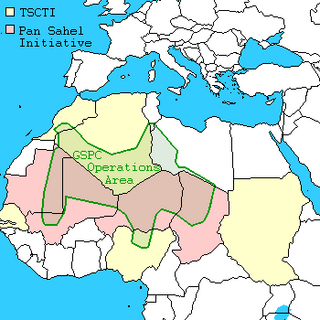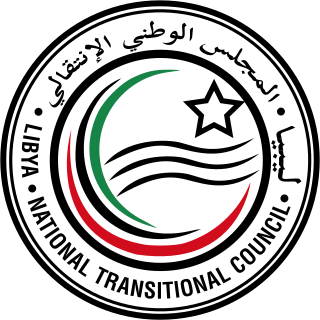Related Research Articles

Al-Qaeda is a pan-Islamist militant organization led by Sunni Jihadists who self-identify as a vanguard spearheading a global Islamist revolution to unite the Muslim world under a supra-national Islamic caliphate. Its membership is mostly composed of Arabs, but also includes people from other ethnic groups. Al-Qaeda has mounted attacks on civilian, economic and military targets of the US and its allies; such as the 1998 US embassy bombings, the USS Cole bombing and the September 11 attacks. The organization is designated as a terrorist group by NATO, UN Security Council, the European Union, and various countries around the world.
The Libyan Islamic Fighting Group (LIFG), also known as Al-Jama'a al-Islamiyyah al-Muqatilah bi-Libya, was an armed Islamist group. Militants participated in the 2011 Libyan Civil War as the Libyan Islamic Movement, and are involved in the Libyan Civil War as members of the Libya Shield Force. Alleged militants include alleged Al Qaeda organizer Abd al-Muhsin Al-Libi who now holds a key command position in the Libya Shield Force.

An Islamist insurgency is taking place in the Maghreb region of North Africa, followed on from the end of the Algerian Civil War in 2002. The Algerian militant group Salafist Group for Preaching and Combat (GSPC) allied itself with al-Qaeda to eventually become al-Qaeda in the Islamic Maghreb (AQIM). The Algerian and other Maghreb governments fighting the militants have worked with the United States and the United Kingdom since 2007, when Operation Enduring Freedom – Trans Sahara began.
Abu Sufian Ibrahim Ahmed Hamuda Bin Qumu is a citizen of Libya who was held in extrajudicial detention in the United States Guantanamo Bay detention camps, in Cuba. Joint Task Force Guantanamo counter-terrorism analysts report he was born on 26 June 1959, in Derna, Libya.

Abu Yahya al-Libi, born Mohamed Hassan Qaid, was a terrorist and leading high-ranking official within al-Qaeda, and an alleged member of the Libyan Islamic Fighting Group.
Mujahideen, or Mujahidin, is the plural form of mujahid, an Arabic term that broadly refers to people who engage in jihad, interpreted in a jurisprudence of Islam as the fight on behalf of God, religion or the community (ummah).

Al-Qaeda has conducted operations and recruited members in Africa. It has included a number of bombing attacks in North Africa and supporting parties in civil wars in Eritrea and Somalia. From 1991 to 1996, Osama bin Laden and other al-Qaeda leaders were based in Sudan.
Abdelhakim Belhaj is a Libyan politician and military leader. He is the leader of the Islamist al-Watan Party and former head of the Tripoli Military Council. He was the emir of the defunct Libyan Islamic Fighting Group, an anti-Gaddafi guerrilla group.

The aftermath of the 2011 Libyan civil war has been characterized by marked change in the social and political order of Libya after the overthrow and killing of Muammar Gaddafi in the civil war that was fought in Libya in 2011. The country has been subject to ongoing proliferation of weapons, Islamic insurgencies, sectarian violence, and lawlessness, with spillovers affecting neighboring countries including Mali.

Ali Muhammad al-Sallabi, or al-Salabi is a Muslim historian, religious scholar and Islamist politician from Libya. He was arrested by the Gaddafi regime, then left Libya and studied Islam in Saudi Arabia and Sudan during the 1990s. He then studied in Qatar under Yusuf al-Qaradawi and returned to Libya during the 2011 overthrow of Gaddafi and distributed weapons, money, and aid to Islamist groups in the country. His actions were criticized by members of the internationally recognized Libyan government under the National Transitional Council who he in turn criticized as being secular.

Al-Nusra Front, also known as Front for the Conquest of the Levant, was a Salafi jihadist organization fighting against Syrian government forces in the Syrian Civil War. Its aim was to overthrow president Bashar al-Assad and establish an Islamic state ruled by Sharia law in Syria.
Since the late 1990s, several members of the Libyan Islamic Fighting Group had decided to leave the band, most of them joining other armed organizations.

Ansar al-Sharia in Libya was an Al-Qaeda-aligned Salafi Jihadist militia group that advocated the implementation of Sharia law across Libya. Ansar al-Sharia came into being in 2011, during the Libyan Civil War. Until January 2015, it was led by its "Amir", Muhammad al-Zahawi. As part of its strategy, the organization targeted specific Libyan and American civilians for death and took part in the 2012 Benghazi attack. The group was designated as a terrorist organization by the United Nations, Iraq, Turkey, the United Arab Emirates, the United Kingdom and the United States.

Ansar al-Sharia is the Derna based branch of a larger Libyan group; the branch is headed by Abu Sufian bin Qumu. In 2011 bin Qumu became the leader of a band of fighters in his hometown of Derna during the 2011 Libyan civil war. The group was reported as disbanding itself following the U.S. Consulate attack in Benghazi however by late 2013 the group had re-emerged in the city as a branch of the Benghazi-based Ansar al-Sharia under the slogan "A step toward building the Islamic state".

Mokhtar Belmokhtar, also known as Khalid Abu al-Abbas, The One-Eyed, Nelson, and The Uncatchable, was an Algerian leader of the group Al-Murabitoun, former military commander of Al-Qaeda in the Maghreb, smuggler and weapons dealer. He was twice convicted and sentenced to death in absentia under separate charges in Algerian courts: in 2007 for terrorism and in 2008 for murder. In 2004, he was sentenced to life imprisonment in Algeria for terrorist activities.

Foreign fighters have fought on all four sides of the Syrian Civil War, as well both sides of the War in Iraq. In addition to Sunni foreign fighters, Shia fighters from several countries have joined pro-government militias in Syria, leftist militants have joined Kurdish forces, and other foreign fighters have joined jihadist organizations and private military contractors recruit globally. Estimates of the total number of foreign Sunnis who have fought for the Syrian rebels over the course of the conflict range from 5,000 to over 10,000, while foreign Shia fighters numbered around 10,000 or less in 2013 rising to between 15,000 and 25,000 in 2017.

In October 2014, the self-declared Islamic State of Iraq and the Levant (ISIL) took control of numerous government buildings, security vehicles and local landmarks in the Eastern Libyan coastal city of Derna. Although some media outlets reported the control as being absolute, rival groups like the al-Qaeda-affiliated Abu Salim Martyrs Brigade continued to control parts of the city. Clashes erupted between ISIL and an alliance of Islamist groups in June 2015, with ISIL retreating from Derna to outlying suburbs the following month. However, clashes continued between the Islamist alliance and the Tobruk-based government forces.

The Islamic State – Libya Province is a militant Islamist group active in Libya under three branches: Fezzan Province in the desert south, Cyrenaica Province in the east, and Tripolitania Province in the west. The branches were formed on 13 November 2014, following pledges of allegiance to IS leader Abu Bakr al-Baghdadi by militants in Libya.

Foreign fighters in the Syrian civil war have come to Syria and joined all four sides in the war. In addition to Sunni foreign fighters arriving to defend the Islamic State of Iraq and the Levant or join the Syrian rebels, Shia fighters from several countries have joined pro-government militias in Syria, and leftists have become foreign fighters in the Syrian Democratic Forces.
References
- 1 2 Abigail Hauslohner (March 30, 2012). "With Libya's Ascendant Islamists: 'Don't Get the Wrong Idea'". Time . Archived from the original on April 1, 2012.
- 1 2 Charles Levison (April 2, 2011). "Ex-Mujahedeen Help Lead Libyan Rebels". The Wall Street Journal .
Two former Afghan Mujahedeen and a six-year detainee at Guantanamo Bay have stepped to the fore of this city's military campaign, training new recruits for the front and to protect the city from infiltrators loyal to Col. Moammar Gadhafi.
- 1 2 Swami, Praveen (25 Mar 2011). "Libyan rebel commander admits his fighters have al-Qaeda links". The Daily Telegraph . Retrieved 15 November 2011.
- 1 2 Roberto Bongiorn (March 22, 2011). "Noi ribelli, islamici e tolleranti". Il Sole 24 Ore (in Italian). (translation)
- ↑ David D. Kirkpatrick (June 23, 2012). "Libya Democracy Clashes With Fervor for Jihad". The New York Times .